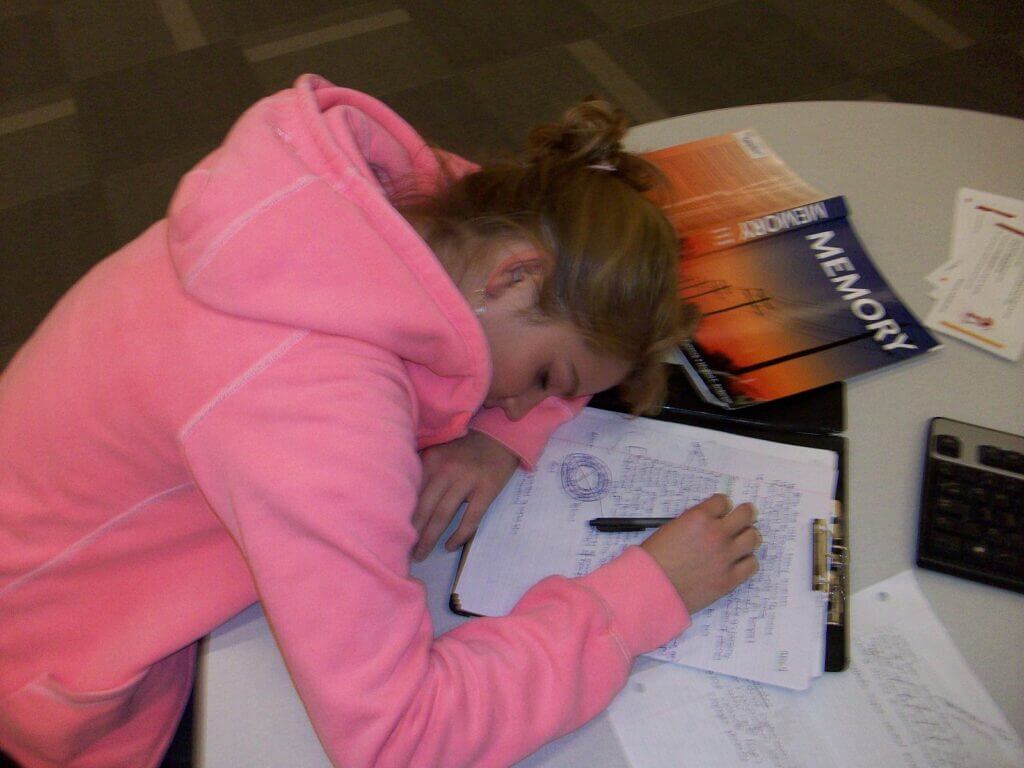9 Ways to Improve Sleep Habits Before the First Day of School

It can be difficult to improve sleep habits during the summertime. You don’t have anywhere to be in the morning. No reason to get up before daylight. It’s just you and the comforter!
As school looms closer, however, you will need to get those sleep habits in check, or it’s going to be a rough first week of school (and perhaps semester or year). In the following article, we’ll be sharing nine tips that you can put to use right now to avoid the grogginess and misery of missing sleep as the school year begins.
Try incorporating each of these before it’s too late. From getting regular exercise to setting a pre-sleep routine, we think you’ll find each of these suggestions highly useful to your school year. Take what sounds good, leave what doesn’t, and find the routine that works the best for you. Good luck. Let’s get it started!

1. Start tracking your sleep
It’s important to track your sleep because it’s a huge factor in your productivity. If you’re tired, you’re more likely to make mistakes and have trouble focusing on tasks that demand your attention. If you’re not concerned with the quality of your sleep, then you’re missing out on a great opportunity to improve your health.
If you track your sleep, then you’ll know what’s causing you to wake up during the night and you’ll be able to fix it. Consider using an app like Sleep Cycle to track your sleep. It’s an app that tracks your movement using the phone’s accelerometer. It can tell when you’re in a deep sleep versus a light sleep and can wake you up during the light sleep periods to help you avoid grogginess.
2. Improve your morning routine for a better night’s sleep
One of the easiest ways to improve your morning routine is to make your bed immediately when you wake up. That way, you’ll be more likely to follow the rest of your morning routine. If you start your morning by making your bed, it’ll be far easier to remain consistent with the rest of your morning routine.
If you have a negative morning routine, then it can really impact your sleep. If you’re rushing around in the morning, you’re more likely to struggle to sleep because your body is in overdrive. So if you can improve the quality of your morning routine, then you’re going to get more sleep at night.
There are two common roadblocks to building a better morning routine. The first is a lack of planning and preparation. If you don’t set aside time the night before to plan your next day, it’s much harder to make the most of your morning. The second is a lack of prioritization. It’s just not a major goal to manage your sleep throughout the week, so you have to end up overdoing it on the weekend.
3. Adopt healthy habits
The three things that will make you a better student are keeping a schedule, sleeping well, and exercising regularly. When it comes to keeping a schedule, it’s important to know when your classes are and to plan out your day accordingly. This will help you to be more productive because you’ll be more organized.
These healthy habits are all about helping you to be present in the classroom. If you’re not present in the classroom, you’ll struggle to absorb the material that’s being taught to you. If you’re struggling to understand the concepts being taught to you, you’ll struggle to answer exam questions correctly.
Use healthy habits to overwrite bad habits. For example, if you’re trying to break a soda habit, then you can replace that with a water habit. And, if you’re trying to break a soda habit and a chocolate habit, then you can replace both with a glass of water and a piece of fruit.
4. Set up your bedroom for optimal sleep conditions
The best room for sleeping is a dark room. While you sleep, your body needs to be able to distinguish between day and night. If you have a room that’s too bright during the day, you’re going to have a hard time sleeping at night. If you’re trying to get better sleep, there’s nothing more important than making your room as sleep-friendly as possible. You can do this by keeping your room dark and cool, and by making sure it’s free from distractions.
One of the biggest factors that affects your sleep is the temperature of the room. If it’s too hot, then you’ll have a harder time falling asleep because it’s uncomfortable. If it’s too cold, you might wake up throughout the night because you’re not able to get comfortable. Experiment with temps, keeping in mind that your body temperature naturally drops while in a state of sleep. When you settle on something, stick with it!
5. Make a list of things that stress you out and find ways to manage those stressors
Stress is a normal part of life, and everyone faces different types of stressors. Not everyone faces the same types of stressors that you face, so you’re always going to have to find ways to learn to cope with your own specific challenges. Common stressors faced by students include exams, essays, work, and relationships. It can be pretty overwhelming to have so many things to juggle at the same time.
To deal with it all, do activities that put you in a good mood but are also healthy for your body and mind. That can be things like cooking and meal prep for the week, exercise, writing, bicycling, reading, or going out with friends.
6. Nap like a pro to avoid exhaustion and improve productivity
Napping can be a good way to make up for lost sleep. If you don’t get enough sleep at night, try taking a nap during the day to make up for it. However, you don’t want to make a nap a habit because that can disrupt your sleep cycle. The best way to nap is to set a specific alarm and a specific time you want to wake up.
Don’t sleep past your alarm, and don’t sleep for more than 20 minutes. According to Dr. Matthew Walker, the director of UC Berkeley’s Sleep and Neuroimaging Lab, the best time to nap is between 1 PM and 3 PM. Sleeping for more than 20 minutes can leave you feeling groggy. If you sleep for less than 20 minutes, you can wake up feeling refreshed and energized.
7. Stay away from these foods before bedtime to get the most out of your day
When you eat certain foods before bed, you can have trouble sleeping. Dairy, sugar, and caffeine have all been linked to poor sleep. So, try to avoid these foods at least three hours before bedtime if you’re having trouble sleeping. Avoid eating too close to bedtime because your body needs time to digest the foods you’ve eaten. Eating too close to bedtime will disturb the digestive process, leading to stomach troubles.
Instead, make sure to finish eating at least two to three hours before bed. Certain foods can make it harder to sleep. If you eat something too close to bedtime, your body doesn’t have time to digest it, so it can cause heartburn or indigestion that keeps you awake. Another culprit is caffeine. Added sugars before bed are also bad for the teeth. All these factors may contribute to morning grogginess and diminished performance in school.
8. Use relaxation techniques to help you fall asleep faster
According to the National Sleep Foundation, engaging in an activity that relaxes you and takes your mind off of your worries can help you fall asleep faster. Examples of relaxing activities include reading, listening to music, meditating, or doing yoga. Your body and mind are like a car, and your bed is like the garage. If you drive every day and never let your car rest, it’s going to break down on you. Same goes for your body.
It’s important to take time out of your day and take care of yourself, even if it’s just for five or ten minutes. A good relaxation ritual for students might be something like taking a bath or reading a book. Deep breathing, progressive muscle relaxation (PMR), or even the 4-7-8 breathing technique, are good ideas as well. These techniques can help you relax your body and mind, which will make it easier to fall and stay asleep. Find something that works for you because it’s important to take time out for yourself.
9. Adopt nighttime rituals
It’s important to have a bedtime routine that helps you wind down and relax before you go to bed. Studies have shown that habits like taking a warm bath or reading a book help you to relax and get into the mindset of sleeping. We all have certain habits that we do at the same time every day. For example, if you’re a morning person, you probably get up at a certain time every day and have a morning routine that you follow. If you’re a night owl, you probably stay up late and have a bedtime routine that you follow.
Avoid drinking alcohol and caffeine in the hours before bed. Alcohol disrupts sleep cycles and caffeine can have the same effect. Don’t eat a heavy meal before bed. If you’re going to eat a large meal before bed, make sure it’s at least two hours before you go to sleep.
One of the worst things you can do is go to bed with your phone, tablet, or laptop. Blue light from these devices can disrupt your circadian rhythms and make it harder to fall asleep, so it’s best to charge them in another room.
When You Improve Sleep Habits, You Improve Your Life
We hope this look at ways to improve sleep habits will be beneficial as you face a new school year. Remember that now is the time to start. Doing so will keep you from having to catch up at the first of the school year and save you from a lot of groggy mornings. What are some things that you’ve done to sleep better at night? Share your tips in the comments section below!
[Featured Image by Wikimedia Commons]








